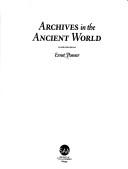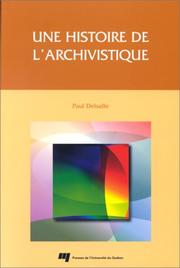| Listing 1 - 9 of 9 |
Sort by
|
Book
ISBN: 2940146578 9782940146574 Year: 2006 Publisher: Lausanne Antipodes
Abstract | Keywords | Export | Availability | Bookmark
 Loading...
Loading...Choose an application
- Reference Manager
- EndNote
- RefWorks (Direct export to RefWorks)
Book
ISBN: 9782364412002 2364412005 Year: 2017 Publisher: Dijon : Editions universitaires de Dijon,
Abstract | Keywords | Export | Availability | Bookmark
 Loading...
Loading...Choose an application
- Reference Manager
- EndNote
- RefWorks (Direct export to RefWorks)
"Jacquet étant dans le ministère une espèce de ver luisant qui jetait la lumière à ses heures sur les correspondances secrètes, en déchiffrant et en classant les dépêches". Ainsi Balzac décrit-il en 1833, dans "Ferragus", l'archiviste du ministère des Affaires étrangères. Le ver luisant forme, aux côtés du rat, de la souris ou de la fourmi, le flatteur bestiaire de l'archiviste. Ce petit animal aux activités cachées a ses heures de gloire dans les soirées d'été. Bestiole modeste par sa taille et sa position, l'archiviste travaille le plus souvent dans l'obscurité, qu'il illumine pourtant à l'occasion, éclairant alors, dans l'opinion publique, une partie du présent et du passé. Dans nos sociétés à la fois hypermnésiques et amnésiques, à quoi sert un archiviste ? Ne va-t-il pas s'éteindre à tout jamais, au milieu des brillances du cloud, dans une indifférence entrecoupée, par intermittence, de la nostalgie des étés d'antan ? L'histoire récente et les perspectives d'avenir montrent au contraire que la perception de ce métier obscur change, que son utilité et sa visibilité vont croissantes, grâce à la révolution numérique et à un engagement affirmé en direction des publics.
Archivistique --- Archivistes --- Prévision --- Archives --- Archives électroniques --- Histoire --- Archivists --- Electronic records --- Archival materials --- History --- Digitization. --- Archives électroniques --- Histoire. --- Archives électroniques. --- Archives - History --- Archival materials - Digitization.
Book
ISBN: 9783835307964 3835307967 Year: 2011 Publisher: Göttingen : Wallstein,
Abstract | Keywords | Export | Availability | Bookmark
 Loading...
Loading...Choose an application
- Reference Manager
- EndNote
- RefWorks (Direct export to RefWorks)
"Literaturhäuser, Archive und Bibliotheken setzen zunehmend auf Ausstellungen als Medium der Präsentation literarischer Texte und ihres Umfeldes. Das Spektrum reicht von der klassischen Vitrinenschau bis hin zur opulenten Multimedia-Inszenierung. Namhafte Experten betrachten in einem ersten Teil das Phänomen 'Literaturausstellung' unter kultur-, literatur- und medienwissenschaftlichen Gesichtspunkten. Im zweiten Teil des Bandes präsentieren Kuratoren und Gestalter Beispiele für international erfolgreiche Literaturausstellungen aus dem ersten Jahrzehnt des 21. Jahrhunderts. Darunter Ausstellungen zu : James Joyce (Dublin 2004) und William Butler Yeats (Dublin 2006) ; Sigmund Freud (Berlin 2006) ; Arno Schmidt (Marbach 2006) ; Robert Walser (Frankfurt, Berlin, Prag, Bern 2006/07) ; Samuel Beckett (Paris 2007) ; Walter Kempowski (Berlin 2007) ; Arthur Schnitzler (Wien, Bratislava, Triest, Linz, Bozen u.a. 2007/08) ; Pier Paolo Pasolini (Zürich, Berlin 2006/09) und mehrere Ausstellungen des Deutschen Literaturarchvs Marbach aus den Jahren 2006 bis 2009, darunter die 2006 eröffnete Dauerausstellung des neuen Literaturmuseums der Moderne. Im dritten Teil wird die 2010 im Frankfurter Goethe-Haus gezeigte experimentelle 'Meta'-Ausstellung dokumentiert, die unter dem Titel 'Wie stellt man Literatur aus? Sieben Positionen zu Goethes' Wilhelm Meister'' in Zusammenarbeit mit renommierten Ausstellungsmachern das Spektrum der Möglichkeiten mit diskursiven und künstlerischen Mitteln erkundete."
Literature --- Authors --- Library exhibits --- Archives --- History --- Literature - History --- Authors - History --- Library exhibits - History --- Archives - History --- History and criticism. --- History. --- Livres --- Littérature --- Expositions --- Expositions.

ISBN: 0674044630 9780674044630 Year: 1972 Publisher: Cambridge Harvard university
Abstract | Keywords | Export | Availability | Bookmark
 Loading...
Loading...Choose an application
- Reference Manager
- EndNote
- RefWorks (Direct export to RefWorks)
Archives --- history --- History --- Histoire --- 930.25 <37/38> --- -Archives --- -Documents --- Manuscript depositories --- Manuscript repositories --- Manuscripts --- Documentation --- Information services --- Records --- Cartularies --- Charters --- Diplomatics --- Public records --- Archiefwetenschap. Archivistiek--?<37/38> --- -History --- -Depositories --- Repositories --- -Archiefwetenschap. Archivistiek--?<37/38> --- -930.25 <37/38> --- 930.25 <37/38> Archiefwetenschap. Archivistiek--?<37/38> --- Documents --- Depositories --- history. --- Archives - History - To 500 --- Archives - History - 500-1400
Book
ISBN: 3525358695 9783525358696 Year: 2007 Volume: 221 Publisher: Göttingen Vandenhoeck und Ruprecht
Abstract | Keywords | Export | Availability | Bookmark
 Loading...
Loading...Choose an application
- Reference Manager
- EndNote
- RefWorks (Direct export to RefWorks)
Libraries --- Archives --- History --- 02 <063> --- Documentation --- Public institutions --- Librarians --- Documents --- Manuscript depositories --- Manuscript repositories --- Manuscripts --- Information services --- Records --- Cartularies --- Charters --- Diplomatics --- Public records --- 02 <063> Bibliotheekwezen--Congressen --- Bibliotheekwezen--Congressen --- Depositories --- Repositories --- Conferences - Meetings --- Libraries - History - Congresses --- Archives - History - Congresses
Book
ISBN: 1978823177 Year: 2023 Publisher: Rutgers University Press
Abstract | Keywords | Export | Availability | Bookmark
 Loading...
Loading...Choose an application
- Reference Manager
- EndNote
- RefWorks (Direct export to RefWorks)
"Matchmaking in the Archive draws the reader into intimate paired relationships between the living and the dead. Each pair was formed through a unique matchmaking process that took place in the archives of The Gay Lesbian Bisexual Transgender Historical Society. The author, who is also the matchmaker, issued an invitation to wander through one archive, to connect with one person, and to invent a creative response. The nineteen relationships that emerged generated a powerful body of creative work that has been exhibited and performed on four continents. It has encompassed live monologue, poetry, an aria sung by a male soprano, sculptural installations, paintings, photography, personal letters, a jam session, a short film, and the author's uncanny photographic portraits of each matched pair. Underlying the creative work are questions that crop up repeatedly: What is our lineage? How do we remember individual people after they die? What does a person's archive reveal? And, just as critical, what is absent from the archive, what secrets do the artifacts suggest, what shimmers in the gaps?"--

ISBN: 2760508986 9782760508989 Year: 1998 Volume: *1 Publisher: Sainte-Foy (Québec) : Presses de l'Université du Québec,
Abstract | Keywords | Export | Availability | Bookmark
 Loading...
Loading...Choose an application
- Reference Manager
- EndNote
- RefWorks (Direct export to RefWorks)
Les fondements culturels et historiques de l'archivistique des origines à nos jours. Description et analyse des différentes méthodes et techniques qui ont prévalu en Europe, en Afrique et en Amérique. Bien documenté, avec de nombreux exemples choisis.
Archives --- History --- Archivistique --- Archives. --- Archivistique. --- Histoire. --- History. --- Europe --- Histoire --- Archiviste --- Evolution --- Profession --- Role --- Technique. --- Europe. --- 930.25 --- -Archives --- -930.25 Archiefwetenschap. Archivistiek --- Archiefwetenschap. Archivistiek --- Documents --- Manuscript depositories --- Manuscript repositories --- Manuscripts --- Depositories --- Repositories --- 930.25 Archiefwetenschap. Archivistiek --- Documentation --- Information services --- Records --- Cartularies --- Charters --- Diplomatics --- Public records --- Archives - History --- Archives - Europe - History
Book
ISBN: 9782806102256 2806102251 Year: 2015 Volume: 33 Publisher: Louvain-la-Neuve : Academia-l'Harmattan,
Abstract | Keywords | Export | Availability | Bookmark
 Loading...
Loading...Choose an application
- Reference Manager
- EndNote
- RefWorks (Direct export to RefWorks)
L'environnement numérique dans lequel les communautés d'archivistes oeuvrent aujourd'hui modifie la création de l'information, la gestion des documents, leur utilisation par le public et les historiens. S'interroger sur les grandes orientations à venir s'impose. Quels nouveaux regards se porteront sur les archives ou mieux sur l'archive ? Celle-ci devient peu à peu donnée et non plus document, mouvante et non statique, intégrée dans un système d'information et non dans une série documentaire. De nouvelles responsabilités vont s'exercer liées notamment à la mise à disposition des données, à leur nécessaire protection et au droit à l'oubli numérique. De nouveaux usages aussi se font jour grâce aux nouvelles technologies. Ils renouvellent la recherche historique et questionnent les archives au travers d'usages privés, collectifs, publics ou détournés, voire commerciaux. L'archiviste, désormais confronté à de nouveaux défis, s'interroge sur son profil. Il devra réexaminer les fonctions, les missions, les fondements archivistiques et la formation de l'archiviste de demain.
Archives --- Digital media --- Archivistique --- Médias numériques --- Processing --- Technological innovations --- Influence --- Innovations --- archive --- 378.4 <493 LOUVAIN-LA-NEUVE> --- 930.25 --- 930.25 Archiefwetenschap. Archivistiek --- Archiefwetenschap. Archivistiek --- 378.4 <493 LOUVAIN-LA-NEUVE> Universiteiten--België--LOUVAIN-LA-NEUVE --- Universiteiten--België--LOUVAIN-LA-NEUVE --- archief --- Fonds d'archives --- History --- Management --- Forecasting --- Médias numériques --- Administration --- Congresses --- Technological innovations. --- Influence. --- Collectiebeheer documentatie : Archivering documentatie --- Gestion des collections documentation : Achivage documentation --- Archivistique. --- Médias numériques. --- Archives - History --- Archives - Management --- Archives - Forecasting
Book
ISBN: 9780674241206 0674241207 9780674271104 Year: 2020 Publisher: Cambridge, Massachusetts : The Belknap Press of Harvard University Press,
Abstract | Keywords | Export | Availability | Bookmark
 Loading...
Loading...Choose an application
- Reference Manager
- EndNote
- RefWorks (Direct export to RefWorks)
The director of the famed Bodleian Libraries at Oxford narrates the global history of the willful destruction--and surprising survival--of recorded knowledge over the past three millennia. Libraries and archives have been attacked since ancient times but have been especially threatened in the modern era. Today the knowledge they safeguard faces purposeful destruction and willful neglect; deprived of funding, libraries are fighting for their very existence. Burning the Books recounts the history that brought us to this point. Richard Ovenden describes the deliberate destruction of knowledge held in libraries and archives from ancient Alexandria to contemporary Sarajevo, from smashed Assyrian tablets in Iraq to the destroyed immigration documents of the United Kingdom's Windrush generation. He examines both the motivations for these acts -- political, religious, and cultural -- and the broader themes that shape this history. He also looks at attempts to prevent and mitigate attacks on knowledge, exploring the efforts of librarians and archivists to preserve information, often risking their own lives in the process. More than simply repositories for knowledge, libraries and archives inspire and inform citizens. In preserving notions of statehood recorded in such historical documents as the Declaration of Independence, libraries support the state itself. By preserving records of citizenship and records of the rights of citizens as enshrined in legal documents such as the Magna Carta and the decisions of the United States Supreme Court, they support the rule of law. In Burning the Books, Ovenden takes a polemical stance on the social and political importance of the conservation and protection of knowledge, challenging governments in particular, but also society as a whole, to improve public policy and funding for these essential institutions. - Publisher.
024.8 --- 02 <09> --- 02 <09> Bibliotheekwezen:--algemene geschiedenis --- Bibliotheekwezen:--algemene geschiedenis --- 024.8 Beschadiging, verlies en diefstal van boeken door gebruikers. Checkpoint --- Beschadiging, verlies en diefstal van boeken door gebruikers. Checkpoint --- Censorship --- Libraries --- Book burning --- Archives --- Cultural property --- Information science --- Books --- History. --- Destruction and pillage --- History --- Protection. --- Sociological aspects. --- Social aspects --- Social aspects. --- Archives. --- Book burning. --- Censorship. --- Destruction and pillage. --- 1900-2099. --- 024.8 Beschadiging, verlies en diefstal van boeken (door gebruikers). --- Beschadiging, verlies en diefstal van boeken (door gebruikers). --- 378.4 <493 LEUVEN> --- Universiteiten--België--LEUVEN --- Censorship - History. --- Libraries - Destruction and pillage - History - 20th century. --- Libraries - Destruction and pillage - History - 21st century. --- Book burning - History - 20th century. --- Book burning - History - 21st century. --- Archives - History. --- Cultural property - Protection. --- Information science - Sociological aspects. --- Books - Social aspects - History. --- Libraries - Social aspects. --- Archives - Social aspects. --- HISTORY, MODERN--20TH CENTURY --- KNOWLEDGE, SOCIOLOGY OF--HISTORY --- COMMUNICATION AND CULTURE --- LIBRARY INFORMATION NETWORKS --- INFORMATION SOCIETY --- 1900-2099
| Listing 1 - 9 of 9 |
Sort by
|

 Search
Search Feedback
Feedback About UniCat
About UniCat  Help
Help News
News